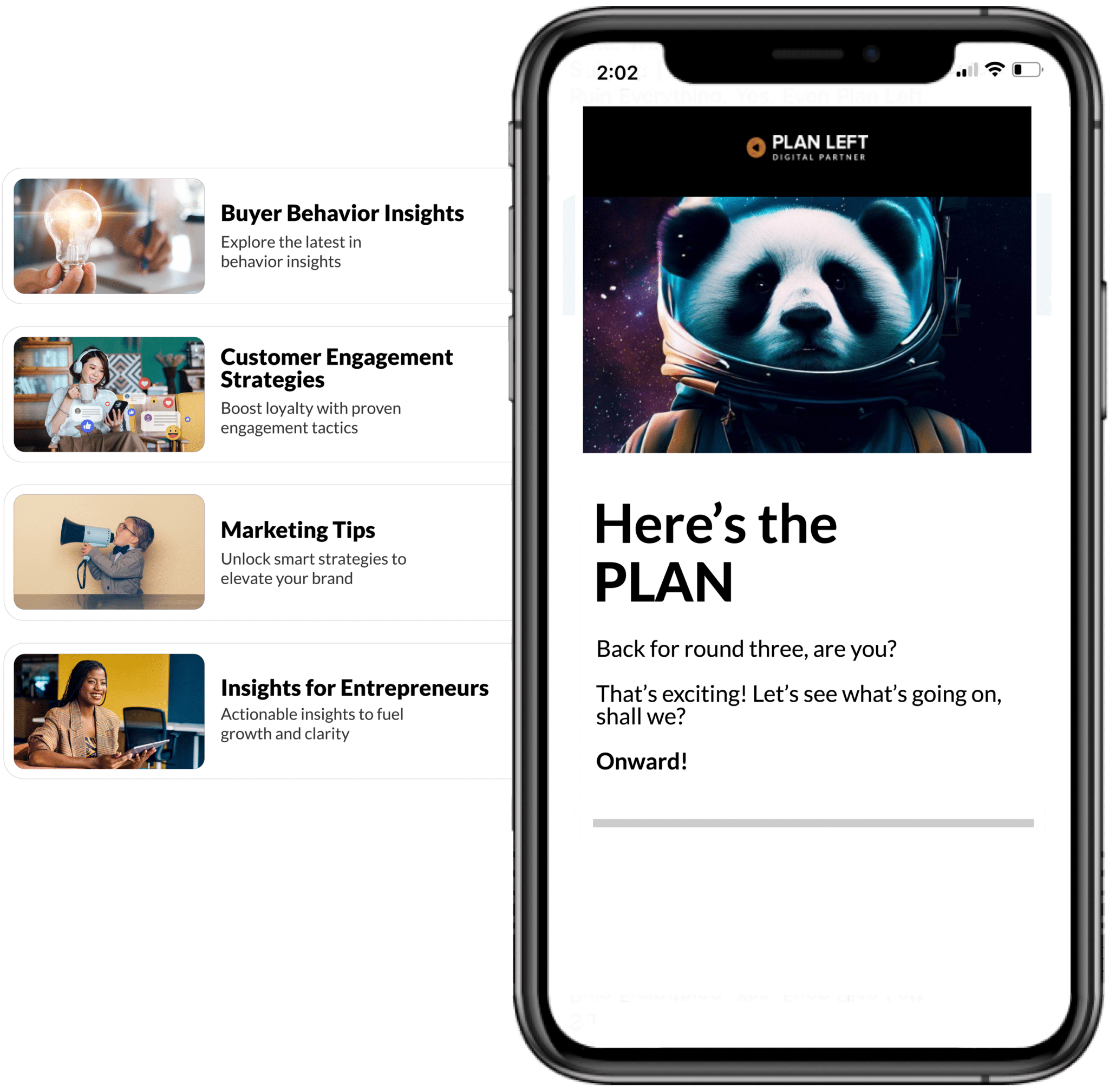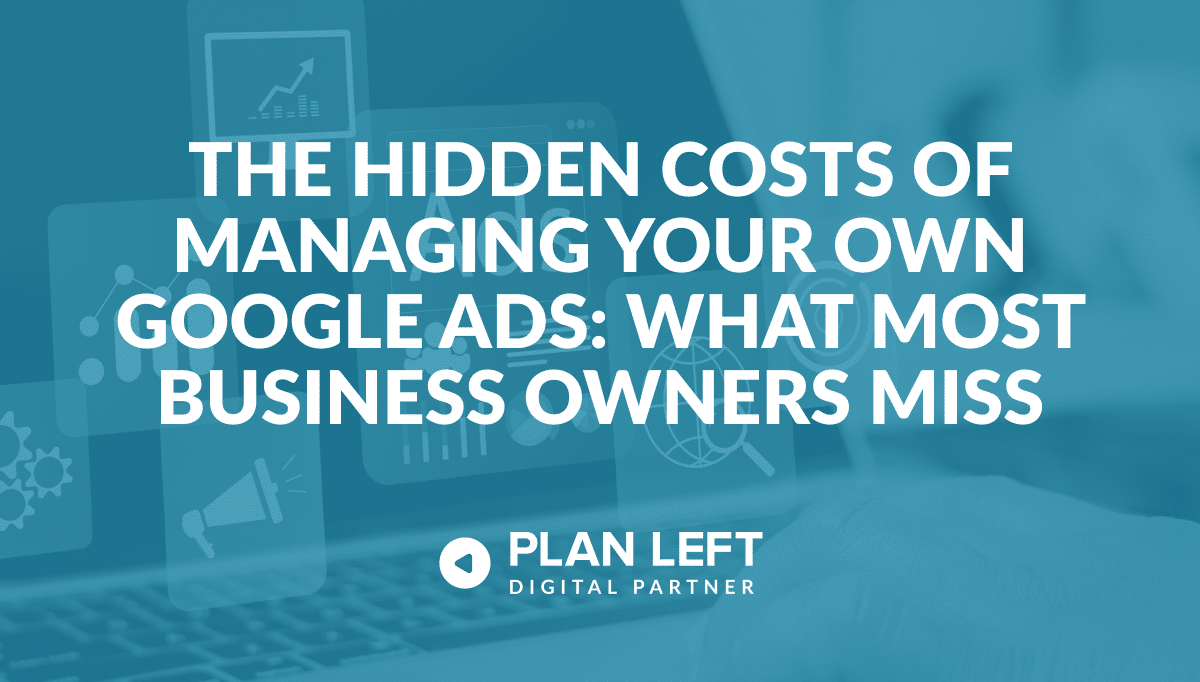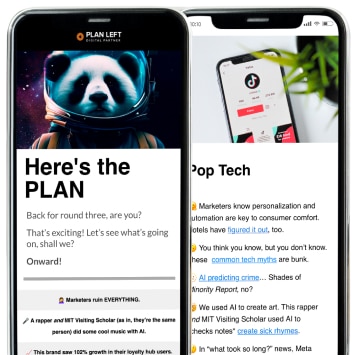
Bing is giving Google some strong competition in this week’s SEO chat with a game-changing ranking patent and an added Android app for their webmaster tools. Google isn’t waiting on the sidelines, though, with updates to GMB suspensions, YouTube’s AI-powered revolution, and we can’t forget the DOJ releasing Google’s ranking secrets. Thank you, DOJ.
YouTube’s AI-Powered Leap
YouTube is harnessing the power of generative AI to revolutionize how we interact with video content and its bustling community. Imagine sifting through heaps of comments to find the gist or sparking a chat with an AI that understands the video context. Sounds like science fiction, right? Well, it’s becoming a reality.
“These features are experimental, and we may not always get it right. That’s why we’re starting small with limited availability and collecting feedback.” – YouTube
So, why should you care? Because YouTube’s AI experiments are not just about smarter viewing. They’re about creating a seamless, interactive, and intuitive video platform that understands users. Whether searchers are there for education, entertainment, or just exploring, these AI features promise to enrich the user experience, making it more accessible and personalized than ever.
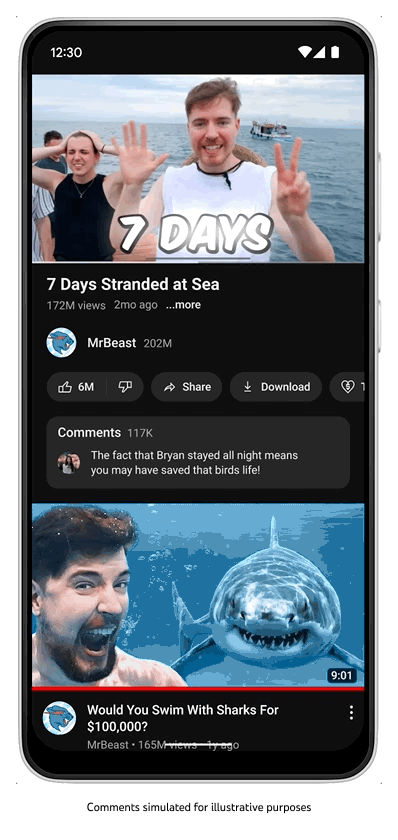
- Simplified Engagement: Diving into the comments section can sometimes feel like an expedition. YouTube is testing an AI-driven feature that summarizes the comment threads for you. So, whether you’re seeking insights or just the highlights, you’re covered with a neat, concise summary.
- Conversational AI Companions: Ever wished for a more interactive video experience? YouTube’s conversational AI could be your new go-to pal, making asking questions and getting information related to the video you’re watching simpler. It’s like having a smart assistant who’s binge-watched everything before you.
Impact on Your YouTube Journey
- For Viewers: Say goodbye to endless scrolling. These AI features will enhance how you engage with content and could lead you to discover new facets of your favorite topics, all while saving time.
- For Creators: This could be a game-changer. With AI summarizing and categorizing comments, creators can easily gauge audience sentiment and feedback, helping them tailor their content to what viewers truly want.
Practical Magic
- Comment Summarization: YouTube’s AI will distill the essence of what viewers are saying, so you won’t miss the community pulse.
- AI Conversations: These could open doors to tailored interactions, offering viewers a chance to ask questions and receive video-specific answers, creating a more engaging and interactive experience.
The use of generative AI on YouTube has the potential to make the platform more accessible by simplifying user interactions and enhancing content comprehension for users with disabilities. From an SEO perspective, it could enrich content metadata and engagement, thereby improving visibility and discoverability across search engines.
Accessibility Enhancements
- Inclusivity for Visual Impairments: Comment summarization makes it easier for visually impaired users to engage in discussions through screen readers. Rather than having the screen reader go through potentially thousands of comments, it reads out a summary, simplifying content consumption.
Assistance for Hearing Impairments: For those with hearing disabilities, conversational AI could provide real-time text support and clarifications about content that might not be clear through captions alone, offering a richer understanding of the video content. - Cognitive Accessibility: Users with cognitive disabilities could benefit from the summarization of complex discussions into simpler, more comprehensible formats. AI conversations that allow for direct questioning help clear up confusion without the need for extensive searching.
- Enhanced Learning Opportunities: Educational content could become more accessible, with AI providing summaries and answering questions, making learning more interactive and adaptable to individual needs.
Community Participation: With easier ways to digest and contribute to comment sections, users with disabilities can participate more fully in the community aspect of YouTube.
SEO Implications
- Improved Engagement Metrics: If AI features make videos more accessible and engaging, users may spend more time on the platform, potentially improving watch-time metrics, which are a critical part of YouTube’s SEO.
- Content Discoverability: AI-generated summaries and conversations could be indexed by search engines, leading to richer snippets in search results and potentially higher click-through rates.
- Better Content Categorization: As AI helps categorize and summarize comments, it could provide YouTube with more data on what a video is truly about, leading to more accurate video categorization and improved visibility in search results for users with specific accessibility needs.
- Richer Metadata for Search Algorithms: Summaries and AI interactions may provide additional metadata that could be used by search algorithms to better understand and rank video content.
- Increased Keyword Relevance: AI-generated content could include a wider range of relevant keywords, helping videos to rank for queries that might not be explicitly covered in the video but are discussed in the comments.
Bing Adds Android Access
Microsoft has expanded the utility of Bing Webmaster Tools by launching a dedicated Android app, allowing users to monitor their website’s performance on the Bing search engine directly from their mobile devices. This strategic move not only offers convenience but also enhances the accessibility of webmaster resources.
The Bing App allows for a more agile and responsive approach to SEO, giving access to immediate action and providing convenience, which can lead to better-maintained and potentially better-performing websites on Bing. For users, particularly those managing their own SEO, it means greater control, efficiency, and the ability to stay connected to how their site is performing, no matter where they are.
SEO on the Go with Bing Webmaster Tools App:
- Real-time Monitoring and Alerts: You can now monitor your website’s performance on Bing in real-time, which means you can react quickly to any changes in their site’s search rankings, indexation issues, or security problems.
- On-the-Go Optimization: With the ability to submit URLs directly from the app, Bing discovers your new content more quickly, potentially speeding up the indexing process and improving content visibility.
- Enhanced Accessibility: The app increases the accessibility of Bing Webmaster Tools, which may encourage more frequent checks and optimizations, leading to better maintained and, thus, potentially higher-ranking sites on Bing.
- User Engagement Insights: By providing immediate access to search traffic data, the app allows users to better understand how website visitors engage with their content, enabling more informed decisions about content strategy and optimization on the fly.
Mastering Bing Rankings With Patented Reliability Score
Microsoft is being granted a patent that could change how search results are ranked by introducing a reliability score for websites and their content. This patent suggests a system where Bing could assess the reliability of a site’s content and factor that into where and how the site appears in search results.
The patent granted to Microsoft introduces a new dimension to SEO practices. Here’s how it can potentially impact SEO and what it means for stakeholders:
Implications for SEO
- Emphasis on Content Quality: SEO strategies may need to focus more on the quality and reliability of information. This includes rigorous fact-checking, citing reputable sources, and ensuring content is up to date and accurate.
- Increased Use of Expertise: Websites may benefit from having content created or reviewed by recognized experts in the field to boost reliability scores.
- User Engagement Matters: Metrics such as user engagement could become more critical, as they might contribute to the reliability score. Websites would need to foster an environment that encourages user interaction and feedback.
Potential Benefits for Ranking
- Trustworthiness as an Asset: Websites with high-reliability scores could see improved rankings, making trustworthiness a valuable SEO asset.
- Competitive Edge: This shift could provide a competitive advantage in search rankings for websites already focusing on high-quality, reliable content.
- Better User Experience: This approach could lead to improved user experiences, as users are more likely to find credible information quickly.
To benefit ranking, webmasters and SEO professionals can take proactive steps:
- Quality Content Creation: Invest in high-quality content creation that prioritizes factual accuracy and depth of information.
- Expert Involvement: Collaborate with industry experts to create or validate content, adding credibility and potentially boosting reliability scores.
- Engage with Users: Encourage user engagement through comments, forums, and feedback mechanisms, and demonstrate responsiveness to user interactions.
Now, you may be thinking, “Oh, so this is the same as Google’s Helpful Content update.” You’d be (sort of) wrong. The Bing ranking patent and Google’s helpful content update are both initiatives aimed at improving the quality of search results, but they approach this goal in different ways:
- Bing’s patent is more about content’s factual reliability and trustworthiness, while Google’s update is about the overall helpfulness and user experience.
- Bing’s approach, as described in the patent, may use a variety of signals to determine reliability, whereas Google’s update uses machine learning to evaluate content helpfulness based on user engagement and satisfaction.
- Microsoft’s patent details are public, giving insights into how the system might work. Google provides guidelines but doesn’t disclose the specifics of its algorithms to prevent system gaming.
In essence, Bing focuses on the accuracy and reliability of content, which is a more objective measure, whereas Google’s update is subjective, centered on the perceived value and helpfulness of content to users. Both, however, are part of broader efforts to improve the search experience by encouraging high-quality content creation.
GMB Profile Suspension Update
A suspended Google Business Profile can invisibly erode your local SEO efforts and disconnect you from potential customers. The suspension removes your business from Google Maps and local search results—a digital black hole that can significantly impact your bottom line.
A suspended profile doesn’t have to spell disaster. Quick and informed actions can make the difference between a temporary setback and a prolonged disruption. With the new process, you can proactively address suspensions, preserving your local SEO’s integrity and maintaining your online presence.
Here’s what you need to know:
- Notification: If your profile is suspended, you’ll receive a notification detailing the specific reasons for the suspension.
- Appeal Submission: Directly through the Google Business Profile interface, you can submit an appeal, which includes providing necessary evidence or corrections.
- Awaiting Review: Once submitted, your appeal will be reviewed by Google’s team. During this period, you’ll have clear visibility into the status of your appeal.
- Resolution: You’ll be informed of the decision, and if successful, your profile will be reinstated, reconnecting you with your audience.
Google’s Ranking Secrets
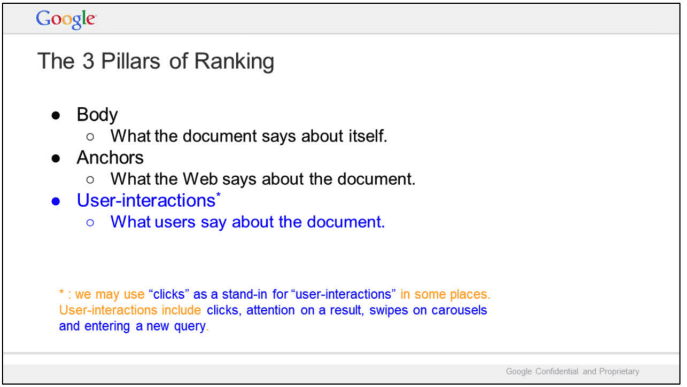
- Pillar 1: Relevance – The Matchmaker of Search
Relevance is the cornerstone of Google’s search philosophy. When a search is made, Google’s primary goal is to return results that closely align with the searcher’s intent. This alignment is achieved through complex analysis of keywords, the user’s search history, and a myriad of other factors that ensure the results are as pertinent as possible to the query. - Pillar 2: Quality – The Gatekeeper of Trust
Google’s commitment to quality is reflected in its relentless pursuit to prioritize content that demonstrates expertise, authoritativeness, and trustworthiness (E-A-T). This means the search engine favors content that isn’t just topically relevant but also comes from reliable sources and authors, effectively acting as a gatekeeper that vets information before presenting it to the user. - Pillar 3: User Experience – The Architect of Satisfaction
The final pillar, user experience (UX), underscores the importance of how users interact with web pages. Google seeks to reward sites that provide a seamless, intuitive, and engaging experience. Factors like page loading speed, mobile-friendliness, and navigation play an important role in users finding what they’re looking for and enjoying the discovery process.
The DOJ’s documents have implications far beyond the legal realm. They serve as a blueprint for businesses, SEO professionals, and digital marketers seeking to optimize their content for Google’s search. Understanding these pillars can help craft strategies that align with Google’s ranking ethos, potentially leading to increased visibility and rankings in search results.
We may not have access to all of Google’s ‘secret sauce,’ but we have a glimpse at the core principles guiding Google’s ranking decisions. For anyone invested in SEO, these insights are invaluable, serving as a compass to navigate the ever-changing best practices of search engine optimization.
The balance between relevance, quality, and UX is delicate and constantly changing, as we’ve seen this year with the back-to-back Google Core Updates. As Google refines its algorithms, the weighting of these pillars can shift, requiring marketers to stay agile and informed. Focusing on one pillar to the detriment of others is a strategy doomed to fail. Give attention to all three and stay ahead in the competitive arena of search rankings.
Watercooler Highlights
But wait, there’s more! You don’t want to miss these noteworthy highlights with SGE expanding to other countries, AI DDoS attacks, and Google Search Console Page Experience report changes. Dive in and don’t miss out.
AI Blackout – OpenAI DDoS Attacks
ChatGPT, API Labs, and Playground experienced a number of outages due to a DDoS attack claimed by ‘Anonymous Sudan,’ who have been sharing the joy of their successful interruptions with screenshots.
The reason for the attack? The group states, “AI is now being used in the development of weapons and by intelligence agencies like Mossad, and Israel also employs AI to further oppress the Palestinians.” Still, they provide no proof or evidence, or links to support their claims.
GSC Simplifies Page Experience Report
Google made changes to the Search Console Page Experience Report to simplify the interface and provide a more intuitive overview of how pages perform against the page experience signals. This update aims to declutter the report by removing the Safe Browsing and Ad Experience widgets, which Google determined were less critical to the overall page experience score.
Transparency in Meta Political Ads
Meta introduced new transparency standards for political ads on its platforms, with the goal being to provide users with more information about the origin of these ads. This initiative includes enhanced identity checks for advertisers and the disclosure of who is paying for the ad. Meta’s approach is designed to combat the spread of misinformation and increase accountability for political messaging, providing users with the necessary context to evaluate the content they’re being shown.
Google Expands SGE
Google’s expansion of its Search Generative Experience (SGE) to more countries and the introduction of new features marks a significant shift towards a more interactive and intuitive search interface. These advancements are expected to enhance user engagement by providing responses that are not only more relevant but also conversational in nature.
For SEO professionals, the implications are clear: there’s a growing need to align with Google’s increasingly sophisticated understanding of natural language and user intent. This means optimizing content to meet the conversational tone and context that users are seeking.
As SGE becomes more prevalent, SEO strategies must evolve to prioritize relevance and user experience, ensuring that content is discoverable and resonates with search interaction dynamics.
SEO is your ace in the hole, and with Plan Left’s Coffee & SEO Chats, you’re always holding a winning hand. We decode the complex, giving you the edge to compete and stay ahead of the competition. Are you ready to challenge the status quo and redefine your digital strategy? Chat with us. Let’s harness the full power of SEO and turn the tables in your favor.
Explore Latest Posts
From Feast-or-Famine to Predictable Revenue: Creating Consistency in Lead Generation The revenue roller coaster is exhausting. Some months your pipeline ... read more
February 25, 2026
Marketing Automation Tools That Actually Save Time (Not Create More Work) Your marketing to-do list keeps growing faster than you ... read more
February 18, 2026
The Hidden Costs of Managing Your Own Google Ads: What Most Business Owners Miss Google Ads seems straightforward enough: pick ... read more
February 11, 2026
Essential Strategies for Entrepreneurs
Get Actionable Business Insights & Marketing Tips
Our newsletter delivers real-world strategies from entrepreneurs who’ve been exactly where you are.
Sign up now for:
- Actionable growth strategies that work
- Insider tactics for attracting top talent
- Real-world case studies from successful founders
- Emerging tech trends that drive innovation
- Pragmatic marketing approaches for visionary leaders
